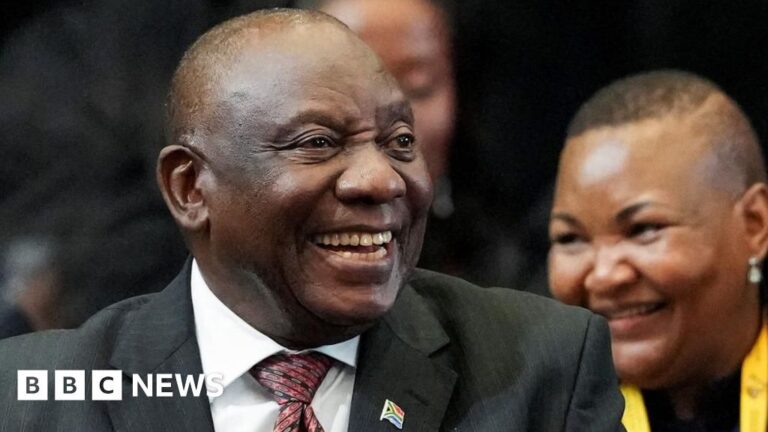- author, Barbara Plett Usher
- role, Africa Correspondent
South Africa’s parliament has re-elected Cyril Ramaphosa as the country’s president, following a landmark coalition agreement between the ruling African National Congress (ANC) and the opposition.
The new national unity government will be made up of Ramaphosa’s ANC, the centre-right Democratic Alliance (DA) and smaller parties.
In his victory speech, President Ramaphosa praised the new coalition government and said voters expected its leaders to “act and work together in the interest of all the people of our country”.
The agreement was reached in a day of great political drama, with parliament meeting late into the night to vote to see who would hold power in the new government.
The agreement comes after weeks of speculation about who the ANC would partner with after last month’s general election saw it lose its parliamentary majority for the first time in three decades.
The party won 40% of the vote, with the DA coming in second with 22%.
ANC secretary-general Fikile Mbalula called the coalition agreement a “remarkable step”.
This meant that Ramaphosa, who replaced Jacob Zuma as president and ANC leader after a bitter power struggle in 2018, was able to retain power.
The next step will be for President Ramaphosa to allocate cabinet posts, including members of the DA.
The multi-party agreement did not involve the two breakaway parties from the ANC, and they will likely stand to benefit if the economic improvements voters want do not materialise.
But opinion polls suggest many South Africans want this unprecedented grand coalition to succeed.
The ANC has consistently enjoyed support rates of more than 50 percent since the country’s first democratic elections in 1994, when Nelson Mandela became president.
But support for the party has fallen sharply amid anger over corruption, unemployment and high crime.
Speaking to South Africa’s Parliament after his confirmation, President Ramaphosa recalled the party’s first presidential victory 30 years ago.
“We have been here before. We were here in 1994 when we tried to unite the country and bring about reconciliation. And now we are here,” he said.
The alliance between the centre-right DA and the ANC is unprecedented, as the two organisations have been rivals for decades.
Under the leadership of Nelson Mandela, the ANC led the movement against the racist apartheid system and won the country’s first democratic elections.
Critics of the DA accuse it of trying to protect the economic privileges built for the country’s white minority during apartheid, a charge it denies.
“Today is a historic day for our country and I see it as the start of a new chapter,” DPP leader John Steenhausen said, addressing lawmakers in Cape Town late on Friday.
The ANC speaker was also sworn in at the National Assembly, with the post of deputy speaker being held by the DA.
Among the party leaders who spoke after the deal was reached on Friday was Julius Malema, leader of the Economic Freedom Fighters party he founded after leaving the ANC in 2013.
He said the party would accept “the results and the voice of South Africans” but criticised the agreement, saying “we will not agree to this marriage of convenience that will strengthen the white monopoly power over South Africa’s economy and means of production.”

